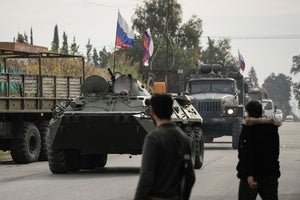After a decade of involvement in Syria, some Russians are eager to withdraw their forces from the country.
The formation of a new transitional government after the ouster of former Syrian President Bashar al-Assad and large-scale withdrawal of Russian forces has left the future of Russia-Syria relations uncertain. While the interim Syrian government remains open to further cooperation with Russia, many Syrians consider Russia an accomplice of the Assad regime and want to expel its forces from their homeland. Data from a Chicago Council on Global Affairs-Levada Center survey, fielded January 23–29, 2025, finds the Russian public is also keen on withdrawing from Syria.
Four in 10 Russians Favor Reducing Military Footprint in Syria
In a stunning offensive campaign last November, a coalition of opposition groups seized control of major cities across Syria, eventually capturing Damascus and ousting Bashar al-Assad from power. To the shock, surprise, and relief of many around the world, the operation toppled the Assad regime—which had ruled Syria with an iron fist for over half a century—and, in a matter of days, ended a civil war that plagued the country for more than a decade.
Embroiled in their own conflicts and disillusioned by Assad’s intransigence on the negotiating table, the regime’s core allies, Russia and Iran, were poorly positioned and largely unwilling to provide additional military support or launch a counteroffensive attack on its behalf. The Syrian military quickly crumbled without the backing of Tehran and Moscow, leaving Assad and his family to flee for Russia, where they were promptly granted asylum.
Soon after the collapse of the Assad government, the Kremlin began a large-scale withdrawal of military equipment and troops from Latakia and Tartus, key military bases that represent Russia’s foothold in the Middle East and eastern Mediterranean and are conduits for Russian activity in North and West Africa. Data from a recent Chicago Council-Levada Center survey finds the plurality of Russians (42%) support the recent withdrawal of Russian armed forces from Syria. However, a third (32%) of Russians oppose the withdrawal and 27 percent are unsure.
Public Support for Involvement in Syria on the Decline
Russian intervention in Syria dates back to 2011, when the Kremlin began providing economic and military support to the Assad regime after large-scale protests during the broader Arab Spring escalated into a civil war. In 2015, Russia launched a direct military intervention to back the government in Damascus, capture territories from American-back opposition groups, and fight against the Islamic State in Syria (ISIS).
The early years of Russia’s involvement in the Syrian civil war enjoyed some public support, as the Kremlin framed Russia’s role in the conflict as one of fighting terrorism, restoring security, and rolling back American influence in the Middle East. In 2015 Levada Center surveys, half of Russians (47%) said their country should support Assad in his fight against ISIS and the Syrian opposition, while three in 10 (28%) argued against getting involved in the military conflict. However, the Russian public was more likely to favor providing the Syrian government with political (67% definitely + probably support), humanitarian (55%), military (43%), and economic (41%) aid rather than with a direct military intervention (14%). In a separate question, a third (35%) said they were afraid direct involvement in the conflict would escalate into a “new Afghanistan” for Russia.
By 2016, most felt the Kremlin had achieved its goals in Syria (69%) and favored withdrawing its military forces from the country (81%). Although Russian President Vladimir Putin declared victory and the withdrawal of Russian troops from Syria on several occasions, Russia’s armed forces remained stationed in the country indefinitely. Levada researchers say that by 2019, Russia’s involvement in the civil war began to move away from the public eye and most Russians became indifferent toward the conflict. However, the majority continued to say Russia should end its operations in Syria (55% in 2019).
Conclusion
The political upheaval in Syria represents a strategic setback for the Kremlin—having spent more than a decade backing the Assad regime—and for broader Russian foreign policy in the Middle East. It is, however, a change welcomed by the Russian public, which has long sought the withdrawal or reduction of Russian forces from Syria. With much up in the air, what shape relations between Russia and the transitional Syrian government will take remains to be seen.
This Chicago Council-Levada Center survey was conducted January 23–29, 2025, among a nationally representative sample of all Russian urban and rural residents. The sample consisted of 1,615 Russians 18 or older from the 137 municipalities in the 50 regions of the Russian Federation. Researchers from the Levada Center conducted personal interviews in respondents’ homes.
The distribution of responses is given as a percentage of the total number. The data set is weighed by gender, age, level of education for each type of settlement (large cities, medium cities, small towns, villages) within each federal district independently, in accordance with Rosstat data. The statistical error of these studies for a sample of 1,600 people (with a probability of 0.95) does not exceed 3.4 percent for indicators around 50 percent, 2.9 percent for indicators around 25 percent/75 percent, 2.0 percent for indicators around 10 percent/90 percent, and 1.5 percent for indicators around 5 percent/95 percent.




Related Content
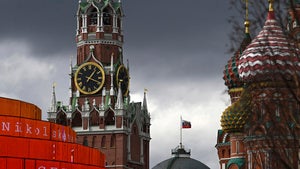 Public Opinion
Public Opinion
At the same time, a plurality feel they are entitled to more.
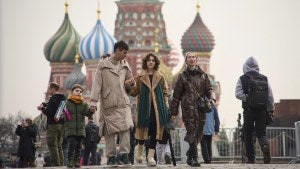 Public Opinion
Public Opinion
While the public thinks Putin’s foreign policies have improved Moscow’s international influence and the state of the Russian military, fewer now say they have boosted their country’s image abroad.
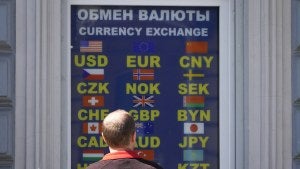 Public Opinion
Public Opinion
Most believe Russia should continue to pursue an independent foreign policy despite the sanctions, which are attributed to the West’s hostility and misunderstanding of the situation in Ukraine.
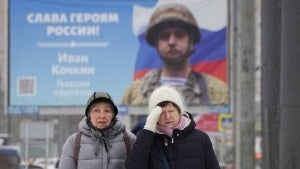 Public Opinion
Public Opinion
But the public is more ready than ever to enter peace negotiations.
